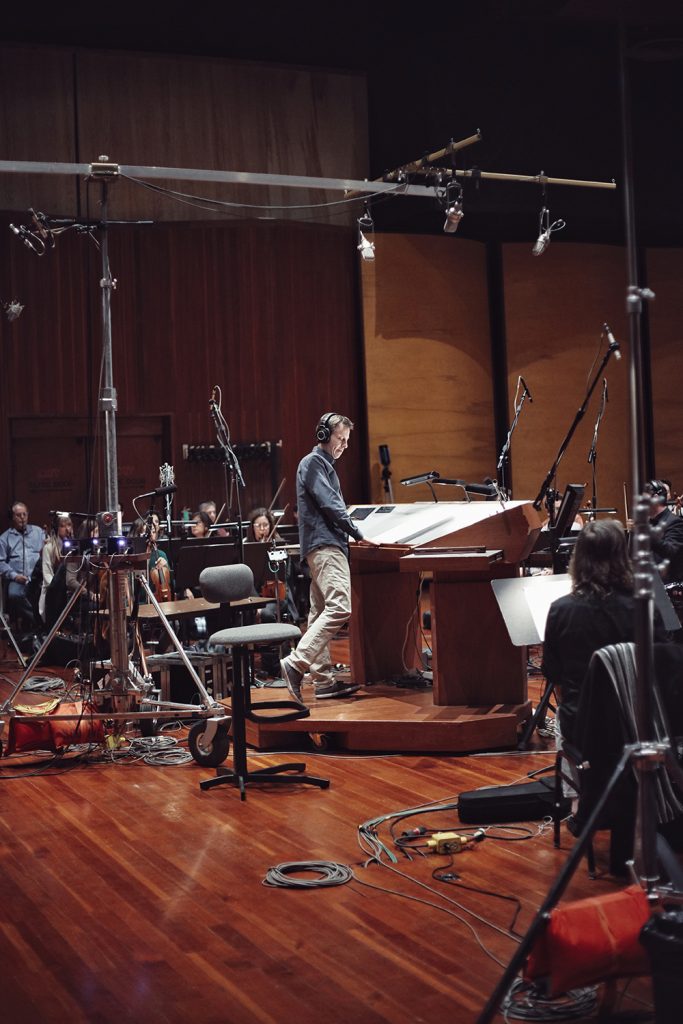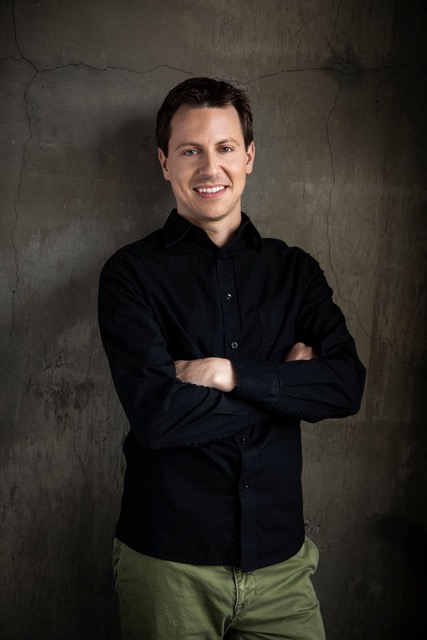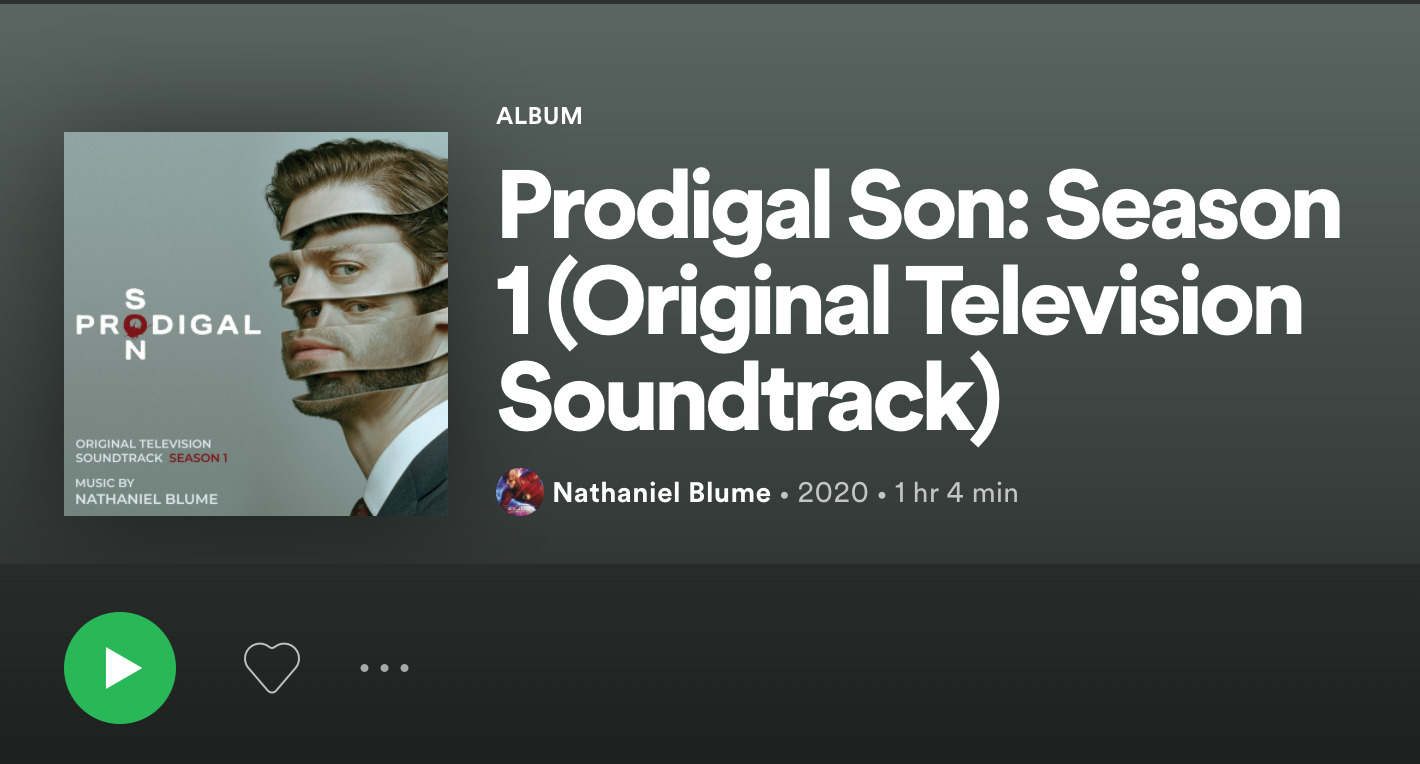How fraught familial drama and steely surgical tools inspired Nathaniel Blume’s killer soundtrack for ‘Prodigal Son’
by Max Weinstein
To say that stories about serial killers enjoy a permanent residency in popular imagination would be to state the obvious. The challenge, now, isn’t for stories about psychopaths to draw an audience, but to offer a fresh take on a subject done to death.
Composer Nathaniel Blume says that “Prodigal Son” — the Fox crime drama he recently scored—meets that challenge by putting family first. The series follows Malcolm Bright (Tom Payne), an ex-FBI profiler whose relationship with his father, serial killer Dr. Martin Whitly (Michael Sheen), gives him unique insight into murderers’ motives. Blume, whose credits include “Arrow” and “The Flash,” approached “Prodigal Son” by focusing more on its characters’ blood ties than on the blood itself.
“My score revolves around the main theme of ‘family’… in fact, the vast majority of the soundtrack includes some reference to that main theme,” Blume explains. His music for “Prodigal Son” amplifies the intensity of Malcolm’s personal and professional crises, milking tension with cacophonous strings and telegraphing trauma with chilly piano melodies. Characters’ past demons inspired his instruments of choice, too: The score is at its most inventive when it’s incorporating the sounds of actual surgical tools into the mix — a sly nod to Martin’s criminal moniker, “The Surgeon.”
Despite the COVID-19 pandemic’s grip on a flailing entertainment industry, Blume has kept plenty busy and earned some recent accolades along the way. In April, he was named one of Variety’s “10 Composers to Watch,” and he’s already gearing up for a just-announced second season of “Prodigal Son.” And though he had to do it under quarantine, he had the rare pleasure of recording the music for the show’s season one finale with one of the show’s stars, Dermot Mulroney. (Like Blume, Mulroney is a card-carrying member of AFM Local 47, so once the actor joined the cast, Blume knew he wouldn’t have to look far to find a consummate cellist.)
We spoke with Blume about scoring “Prodigal Son,” getting around the obstacles of recording remotely, what he’s learned thus far from his career as a composer.
In every series, there are certain core themes that shape the tone of the material. What were some of the themes you identified in the first season of “Prodigal Son” and how did they inform your approach to composing for the show?
“My score essentially revolves around the main theme of ‘family’ that’s introduced within the first two minutes of the show. That concept originated right after I’d read the script for the first time and before I’d seen a frame of footage. In fact, the vast majority of pieces on the soundtrack include some sort of reference to that main theme.
“’I Deserve the Pain’ is, fittingly, a more sad and painful variation of the ‘family’ theme, when Malcolm Bright reveals his identity to the copycat killer in the pilot. One of my favorite cues from one of my favorite episodes is “Uncuffed.” It starts with some strange and uncomfortable harmonies as members of law enforcement realize they’re going to have to remove Martin Whitly’s handcuffs in order to let him save a person’s life. The music releases the tension of that scene with a statement of the main theme when Martin is released from his restraints.
“You’ll also hear a three-note snippet of the ‘family’ theme in ‘A Beta to My Father’s Alpha.’ That motif is used quite a bit throughout the first season, specifically with respect to Martin and his evil dealings.
“The most fun I had with the ‘family’ theme is in ‘I’d Appreciate Some Guidelines,’ where it’s presented as a kind of strange waltz. The scene involves Malcolm in a dance of sorts: He’s interrogating a member of a sex cult who thinks he’s being questioned for a more obvious reason.
“There are other themes and motifs, but that main theme, overtly or not, is really the foundation of the score from which numerous variations and re-orchestrations sprout throughout the first season.”
And now the show’s been picked up for a second season…
“Anyone who has seen the show knows that the family dynamic is about to take a dark and twisted turn. So when it comes to the second season, that will have to be considered when presenting the show’s established ‘family’ theme in new ways, and when I start to come up with new sounds. I do have some other ideas, but the story is really going to dictate if and how those ideas get implemented.”
Much has been made of your use of surgical tools to incorporate their unique sounds into the “Prodigal Son” score. Walk me through that process. How did you find the instruments you used? And once you found the right tools, what were the challenges of integrating them into the score?
“It still feels wrong—almost as if I got away with something I shouldn’t have—but the process started with a visit to eBay, where I simply searched for “surgical tools.” That search pulled up quite a few things, but the first that really caught my eye was a listing for a ‘minor surgery tool kit.’ The kit contained a lot of what you might expect: a scalpel, tweezers, scissors, gauze, etc. So, I bought that first. What wasn’t so obvious in that eBay search was a bone cutter. Now, don’t ask me what the practical use for a bone cutter is when performing surgery, because I can’t tell you. All I can say is that it was marked as ‘new’ and not ‘used,’ so I felt better about purchasing it.
“After acquiring the tools, I got to the studio with some members of my music team and recorded all kinds of sounds. We cut gauze with scissors; dropped the tools in metal bowls (surgeons do that, right? I don’t know, I’ve seen it on TV); a big plastic tarp doubled as a body bag; and we snapped dry chicken bones with the bone cutters. We then chopped all of these sounds up (no pun intended) into audio bits and made virtual software instruments with them — that is, the sounds were playable on my keyboard as a percussion kit of sorts.”
What kind of challenges did you face as you integrated those sounds into the score?
“The trial and error part of the process presented itself in how often each set of sounds was used. The ones that worked well in the score were the ones I’d keep coming back to, and the ones didn’t work as well maybe never even made it into a single cue. As you might imagine, if you rely too much on a ‘sound effect’ element in the music, then you can potentially run into problems with the on-screen action. For instance, if I used the bone snaps in the music that accompanies a crime scene, the audience might mistakenly think the corpse’s bones were cracking. So, the library of surgical tools couldn’t just be thrown all over the score for fun. Careful consideration had to be taken in its application.”
Obviously, working in the throes of the COVID-19 pandemic must have brought about a number of logistical challenges to the process. If you could poll the musicians who worked with you on “Prodigal Son,” what would you guess the most common complaints they’d have about collaborating remotely would be?
“Well, to start with a positive, there was absolutely no Los Angeles traffic for anybody to fight during the at-home recording process. In all seriousness, though, I’ve been saying that everything takes three times as long since the pandemic started. Whether that’s concerning grocery shopping, getting something from the store, or trying to do your job, everything just takes longer.
“So, I’d imagine that’s the biggest complaint from the musicians. What they saved in traffic not having to drive to the recording studio was probably more than made up for in having to act as their own recording engineers. They have to set up their own microphones, receive and set up files for each cue, hit record and stop, and organize their audio to send back to me. That’s why my assistant and I tried to do as much of the hard work as possible before sending files to the musicians. But even then, we can only do so much and a lot is left on the musicians’ plates.”
Did working remotely make it harder to improvise or make any sudden changes to your written music?
“On-the-spot creative decisions were extremely difficult because of the way we bounced files back and forth. However, we had the advantage of working remotely at the end of the season rather than the start of the season. So, for each of the musicians involved, we had already recorded numerous episodes together on a big recording stage. They knew the vibe of the score as well as I did, and if there was anything specific that I wanted to convey to them, it would either be communicated through an email or notated on the score for them to see.
“My biggest takeaway is that while it wasn’t ideal, it was absolutely worth every extra hour that the process required. You think of the musicians as being really good at their instruments — and they are, of course — but you may not think about how technically savvy a lot of them are. But they are: They watch this being done all the time and they’re paying attention. They can send you back some great-sounding recordings, and with the help of my world class music mixer, Jason LaRocca, you’d never know we weren’t all in the same room together. If you have the budget and you’re ready to take on the extra workload, I’d unflinchingly tell any composer to take that opportunity every time.”

Blume on the scoring stage recording “Prodigal Son.”
Dermot Mulroney, who plays cunning billionaire Nicholas Endicott in “Prodigal Son,” also performed as a cellist for your score. Did Dermot’s relationship to the material from the point of view of an actor inform his work with you on the music?
“When I heard Dermot was going to play a recurring character in the final episodes of the first season, I knew immediately that I was going to ask him to play on the score. What made it even more interesting was that he played against type from the romantic hunk we all think of when we hear his name. (We all think that, don’t we?)
“Dermot and I spoke on the phone before recording and I told him how excited I was to have him help color the darkness of his character. He said something that stuck with me, which was that most of his character’s deeds happen off-screen. While we know how evil his character is, we don’t actually see him performing a lot of his dark deeds. So, I think our musical approach to his character works because it’s sneaky and slimy like Nicholas Endicott. And it made it so much more fun that Dermot colored those musical elements with his own playing.”
Your credits are quite eclectic and include a number of documentaries in both TV and film in addition to your work on fiction series and features. What are the most valuable lessons you’ve learned from working on the highlight productions of your career thus far?
“Some lessons are hard to put into words. In any creative endeavor, experience plays a big part in how you successfully navigate the field. For a film composer, there’s no lecture, book, or YouTube video that can teach you the idiosyncrasies of the business. You just have to experience it. In that regard, every project has taught me something about how I handle myself in a meeting or how one of my musical approaches is perceived by a producer. All of these things have to be observed and reflected upon in order to grow.
“So, while a lot of my experiences have taught me something about myself which might not necessarily apply to someone else, I would just stress how important it is to be aware. A lot of composers may experience a time when they had a long talk with a director about their vision, then spent days working on what they just knew was going to blow that director away… only to discover that they weren’t on the same page at all. It might take a good amount of time to think back on that initial discussion and determine where it all went awry, but that’s one of the best things you can do for yourself in order to prevent that from happening again. You always have to trust your instincts and allow your experiences to guide you, and that’s all formed over time.”
View the “Prodigal Son” musicians roster


